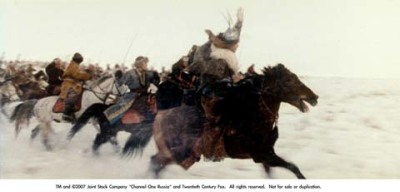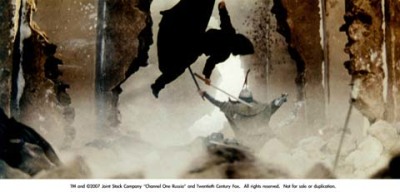By: debbie lynn elias
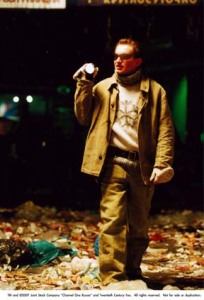
Russian director Timur Bekmambetov is nothing short of a genius. With a successful background in music videos, Bekmambetov has taken those well honed skills and translated them to the big screen with two epic films – the Russian box office bonanza NIGHTWATCH and now its sequel, DAYWATCH. Already grossing over $30 million at the Russian box office, DAYWATCH makes its US debut this week. Based on the novel by Sergei Lukyanenko and Vladimir Vasiliev, DAYWATCH is a mix of “Lord of the Rings”, “Star Wars”, “Star Trek”, ”Bladerunner”, “The Fifth Element” some Harry Potter and Alfred Hitchcock and a razzle dazzle display of pyrotechnics, special effects and rapid fire action and adventure that makes your eyes pop, your mouth drop and you find yourself at the end saying, “WOW!!!!!!”
A continuing story of the balance of good versus evil, in this world night is a battlefield for magicians, witches, warlocks, demons, vampires, transformers and their magicks who live among us in the daylight but who can only fight at night. As a monitor of these black magicks, a special unit called Night Watch is created. And of course, where there is Night there must be Day and thus, the Day Watch is created. The Light Others, embody goodness and light and are members of the Night Watch while The Dark Others, are well, evil and dark. Night Watch regulates the Dark Others and Day Watch the Light Others. Nice system of checks and balances. And of course, there is one playing field on which Dark and Light may meet and fight – the netherworld known as The Gloom.
In the 14th Century, the Mongol conqueror Tamerlan comes into possession of the Chalk of Destiny. A handy little thing to have, the Chalk allows one to either make what they write come true or rewrite history as the case may be. Fast forward to the 21st Century to what could be analogous to post-Communist Russia. Buildings and cities in ruin. Lives destroyed and everyone hoping for things to get better but better never comes.
Enter our heroes, Night Watch members and Light Others Anton Gorodensky and Svetlana. Unfortunately, in responding to a call for help from an elderly woman, Svetlana discovers that Anton’s son Egor has joined the cry of the Dark Others and entertains himself by literally sucking the life out of people with a kid’s juice and a lot of dark magic. Wanting to protect his son and keep his darkness a secret, Anton sets out to destroy all evidence of Egor’s crimes thus setting in motion a battle between good and evil that is soon spiraling out of control and headed for the apocalypse. But wait, let’s not forget about the Chalk!
With only a $4 million budget, director Timur Bekmambetov is nothing short of a miracle worker, With dizzying camera work, a cacophony of special effects compiled by 42 individual Russian CGI studios, rapid-fire editing, kaleidoscopic mesmerizing visuals and a soundtrack that intensifies the story and climaxes with the thrill of a John Phillip Sousa march on the 4th of July, this is a roller coaster ride from start to finish. Vivid and vivaciously intoxicating the non-stop visuals invade and envelope the senses. The film is so well executed that although in Russian, without sub-titles you can understand the essence of the film. Sergei Trofimov’s cinematography is impeccable with an articulate voice all of its own. And to his credit and film, the music video background of director Timur Bekmambetov is undeniably welcome. Given the frenetic energy of the storyline, I can’t imagine anyone taking on this project who didn’t have that sense of rapid pacing and the use of quick imagery to tell a story. The entire good versus evil them is well played and well defined but laced with slivers of nuanced grey that keep the viewer on his toes.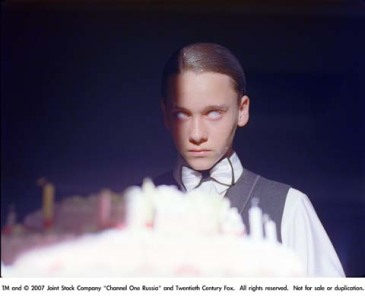
Thanks to Bekmambetov’s guiding hand, Russian filmmaking hasn’t been this powerfully expressive and explosive since Sergei Eisenstein’s BATTLESHIP POTEMKIN back in 1925. The Russian and Eastern European filmmakers deserve a lot more attention than they get. Many, including Bekmambetov, obtain the same if not better result than American filmmakers with blockbuster budgets simply because they use ingenuity, thought and wit to better advantage and it shows.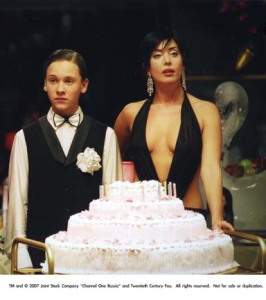
Anton: Konstantin Khabensky Svetlana: Maria Poroshima Zavulon: Victor Verzhbitskiy Egor: Dima Martynov
Directed by Timur Bekmambetov. Written by Bekmambetov, Sergei Lukyanenko and Alexander Talal based on the novel by Sergei Lukyanenko and Vladimir Vasiliev. Rated R. (140 min)